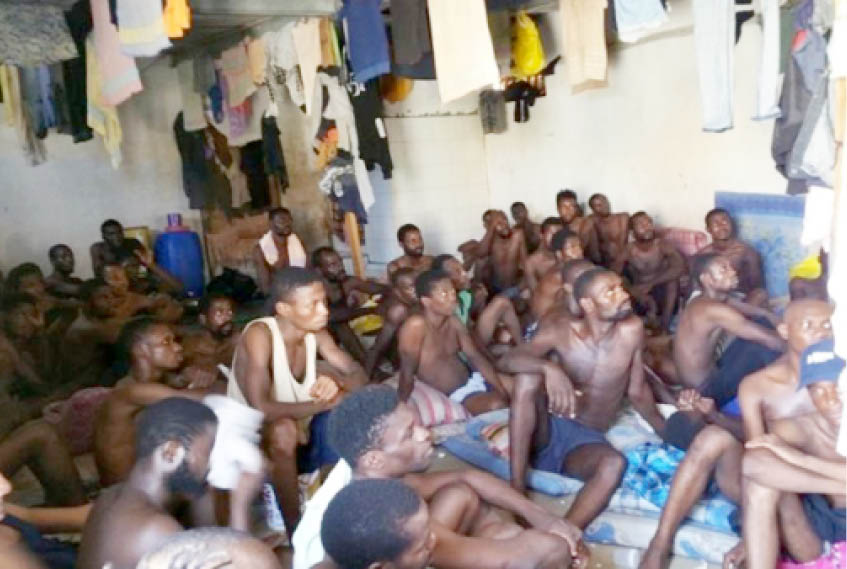The Nigeria police have devised means to decongest its detention facilities amidst the prolonged strike by judicial workers across the country. Visits to various police stations show that expectations that detainees are in overcrowded grim conditions at police stations is not exactly the situation.
The Judicial Staff Union of Nigeria (JUSUN) had, on April 6 announced a nationwide industrial action to press home their demands for the implementation of autonomy for the judiciary in states.
The union’s demands are contained in the provisions of sections 81(3) and 121(3) of the Nigerian constitution, 1999.
Section 81(3) reads, “Any amount standing to the credit of the judiciary in the Consolidated Revenue Fund of the Federation shall be paid directly to the National Judicial Council for disbursement to the heads of the courts established for the federation and the state under section 6 of this constitution.”
Section 121(3) reads, “Any amount standing to the credit of the judiciary in the Consolidated Revenue Fund of the State shall be paid directly to the heads of the courts concerned.”
Courts made a pronouncement on three occasions in 2014 in favour of the constitutional provisions. One of the cases was filed by JUSUN versus 36 state governors with number: FHC/ABJ/CS/667/13; and the two other suits marked: FHC/ABJ/CS/63/2013 and NAD/56/2013 were filed by a former president of the Nigerian Bar Association (NBA), Olisa Agbakoba.
State governors, in a conciliatory meeting brokered by the Federal Ministry of Justice on May 21, agreed with the striking judiciary and parliamentary workers on the autonomy of the arms of government.
But weeks after the agreement, JUSUN is yet to call off the strike while uncertainty still hangs over the implementation of the demands, even as the governors still have a pending application before the Supreme Court challenging the federal government’s interventionist Executive Order 10.
In Kano, 30 inmates share one room
In Kano, the ongoing JUSUN strike has added to the security challenges as most of the cells at police stations are already filled up with suspects of various crimes that need to have their days in court.
During a visit to the police headquarters in Kano by the state branch of the NBA, the place was crowded with suspects, with over 300 suspects occupying about 10 cell rooms, meaning that 30 persons stay in a cell room meant for two or three inmates, at the command headquarters.
A source who pleaded anonymity said the command devised a means of decongesting the prisons by granting bail on some cases pending when courts would resume.
A lawyer who didn’t want to named told Daily Trust on Sunday that in some police divisions of the state, the divisional police officers have turned the situation into a money-making venture as huge money is realised from bail despite the fact that it is supposed to be free as boldly written at various corners of the station.
“In some police stations, honestly, they take advantage of the strike to make money. They grant bail anyhow, just to get money since there is no court and cases cannot be addressed,” she said.
She, however, added that in some stations, the reverse is the case and they do their job diligently and reconcile cases that don’t require them to remand the suspects.
In Imo, security breaches cause random arrests
In Imo State, our correspondent gathered that there are indiscriminate, random arrests of citizens following the wave of insecurity in the state.
Insiders alleged that some innocent persons who were arrested over the Indigenous People of Biafra (IPOB)-fueled militancy were made to part with huge sums of money as police attempt to reduce the congestions in its stations.
Rather than have overfilled cells in those police stations not destroyed by attackers, granting bails to persons with lighter offences while taking those with more serious offences to centres spread in other states has helped keep the number of detainees in the state manageable.
The NBA has also set up a desk in Owerri to receive complaints from aggrieved family members of victims of extra-judicial killings and human rights violations.
It was also gathered that some of the suspects, especially those rearrested after escaping from the Owerri Custodial Centre, were returned to the centre.
The police public relations officer, Bala Elkana, told our correspondent that the state command had the situation under control.
Kaduna police liaise with govt on overstretched facilities
In Kaduna State, the prolonged strike has constituted a clog in the criminal justice system as the 24 or 48-hour time provided by law to take suspects to court has been flouted.
The police public relations officer, ASP Muhammad Jalige, said the command was left with no option than to liaise with the state government to see how to go about the situation.
“We have many detention facilities across the state. When the central detention facility, that is the Criminal Investigation Department (CID) is congested, we decongest to other divisions,” he said.
While police on its own is decongesting the detention centres, he urged complainants not to take laws into their hands, and assured that as soon as courts resume, the suspects will be charged in order to forestall break down of law and order in the state, adding that the First Information Report (FIR) on the suspects are ready.
Similarly, the ongoing strike action by the JUSUN has forced convicts with minor offences into lockdown, according to the spokesperson of the Nigerian Correctional Service, Kaduna command, DSC Zaki Emmanuel.
“Those on trial and those who are supposed to be released on bail, and even those on probation and parole, have all been affected as everything has been put on a standstill,” he said.
In FCT, police detainees not overflowing stations, prisons
While Daily Trust on Sunday learnt that there are no detainees at the Force CID in Area 10, Abuja, the number of detainees at the former Special Anti Robbery Squad (SARS) office in Area 2 could not be ascertained.
The Nigerian Correctional Service maintains the figures of 65,000 inmates which it had shortly before the strike.
Detainees in Benue face special trials
In Benue State, the police and judiciary have an arrangement where they make special arraignments for detainees when centres overflow; and they are further remanded in custodial centres pending the resumption of the courts.
This special arrangement, according to findings by our correspondent, resulted in officials at the custodial centre in Makurdi claiming that there is no tension on the intake of new inmates.
The arrangement not to flood the police station with suspects is between the judiciary, police and the custodial centre, such that most people don’t even know about it.
When contacted, the police public relations officer in the state, DSP Catherine Anene, however, said the command had been granting bail to those who merit it and kept some under police supervisee. This means that they will continue to report to the police on particular days until the courts resume.
Lagos officials, magistrates embark on decongestion exercise
On Monday, May 17, 2021, magistrates from the Lagos State Judiciary, in collaboration with the Lagos State Ministry of Justice, the Legal Aid Council of Nigeria (Lagos State), the Nigerian Bar Association in Lagos State and Police Duty Solicitors (PDSS) began a weeklong intervention to decongest police stations in Lagos State after weeks of the strike by the JUSUN.
The intervention, which empowers magistrates to visit police detention facilities as prescribed under Sections 33 and 34 of the Administration of Criminal Justice Act 2015, was carried out at the state Criminal Investigation Department (CID), Panti.
Three magistrates attend to over 150 suspects in detention under the supervision of the deputy registrars, Legal and Special Duties.
The magistrates treat both felony and misdemeanour cases and grant bail to suspects whose offences are bailable.
One of the notable cases treated was the case of Baba Ijesha, who was granted bail on stringent conditions and on the grounds that he needed medical attention.
The magistrates spent over nine hours at the state Panti, sifting through over 200 detainees in police custody.
Strike increases corruption, rights violation – NHRC, CURE
The executive secretary of the National Human Rights Commission (NHRC), Dr Anthony Ojukwu, said it was bad that the courts are not sitting and the action of the striking judicial workers is now violating the human rights of other people at a time of serious insecurity in the country.
“I don’t have any proof whether they are extorting the people, but it has always been because even on a normal day, people don’t even know that they don’t have to pay for bail,” he said.
The executive director of Citizens United for the Rehabilitation of Errants (CURE), Sylvester Uhaa, said the two-month-old strike had caused a huge reverse to the gains made by the federal government, especially the attempt to decongest prisons nationwide and reform the criminal justice system.
“The impact of the strike on the criminal justice is quite huge and would last for a very long time,” he said.
He also faulted the power of the police to arrest and release suspects on bail without first charging them to court, adding that the situation has created corruption within the law enforcement agency.
By John C. Azu (Abuja), Zahraddeen Yakubu Shuaibu (Kano), Maryam Ahmadu-Suka (Kaduna), Jude Owuamanam (Owerri), Hope Abah Emmanuel (Makurdi) & Adelanwa Bamgboye

 Join Daily Trust WhatsApp Community For Quick Access To News and Happenings Around You.
Join Daily Trust WhatsApp Community For Quick Access To News and Happenings Around You.


